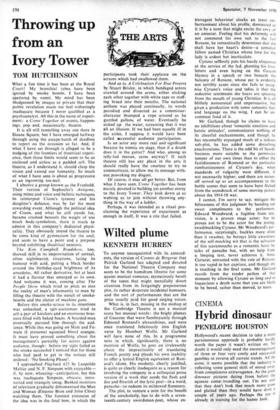Throwing up from an Ivory Tower
TOM HUTCHIN SON
What a fun time it has been at the Royal Court! My bronchial tubes have been ignited by smoke bombs. I have been spattered by vomit. My mind has been bludgeoned by images so private that their public revelation made me feel witheringly inadequate because I never qualified as a psychoanalyst. All this in the name of experi- ment: a Come Together of events, happen4 ings, pop and, occasionally, theatre.
It is all still tunnelling away out there in Sloane Square, but I have emerged halfway through using the escape-hatch of deadline to report on the occasion so far. And, if what I have sat through is alleged to be a nudging of the frontiers of theatrical experi- ence, then those limits would seem to be as enclosed and airless as a padded cell. The theatre, as I understand it, should clasp the vision and extend our humanity. So much of what I have seen is about as progressive as an ingrowing toe-nail.
I absolve a group known as the Freehold. Their version of Sophocles's Antigone, using mime and voice and balletic techniques to reinterpret Creon's tyranny and his daughter's defiance, was by far the most rewarding event. Although the political idea of Creon, and what he still stands for, became crushed beneath the weight of too much body-symbolism, there is much to admire in this company's dedicated physi- cality. They obviously intend the theatre to be some kind of gymnasium for the soul, and seem to have a point and a purpose beyond exhibiting theatrical neurosis.
The Ken Campbell Roadshow, too, showed skill in its improvisation of surreal, often nightmarish situations, lacing its humour with acid, putting a black border around the birthday-card brightness of its anecdotes. All rather derivative, but at least it had a flavour that emerged as its own. And welcome it was, coming after The People Show which tried to pitch us into the reality of man's inhumanity to man by filling the theatre with the stench of smoke- bombs and the clatter of machine guns.
Before this smoke-screen to its intentions was unleashed, a spiv-auctioneer tried to sell a pair of knickers and an enormous bras- siere filled with baked beans. A bearded man eventually pursued him through the aud- ience. While this was going on Male and Fe- male (I presume) squeezed blood oranges. It must have proved something about the management's partiality for actors against audience, though: before my sight failed as the smoke succeeded I noticed that for those who had paid to get in the notices still ordered: 'No Smoking Please'.
I approached Playback 625 by Leopoldo Mahler and N. F. Simpson with enjoyable— if, by now, wheezing—anticipation, but this was inadequate Simpson, obscure, intro- verted and strangely smug. Banked monitors of television gradually dehumanised the Man and Woman (Eleanor Bron and John Clive) watching them. The funniest extension of the idea was in the final bow, in which the participants took their applause on the screens which had swallowed them.
And so to A Celebration For Due Process by Stuart Brisley, in which bandaged actors crawled around the arena, either sticking each other together with white tape or stuff- ing bread into their mouths. The national anthem was played continually, its words parodied and dissected as a commissar- character thumped a rope around as he guzzled gallons of water. Eventually he sicked up the water, screaming that it was all an illusion. If we had been equally ill in the aisles, I suppose it would have been called successful audience participation.
Is an actor any more real and significant because he vomits on stage, than if a drunk does it in the gutter? And who, among us telly-fed masses, cares anyway? If such theatre still has any place in the arts it should really have the courtesy to try to communicate, to allow me its message with- out provoking my disgust.
Of course, it may all get better. But, from what I have seen, Come Together has been mainly devoted to building yet another storey to the Ivory Tower. They look down at us wanting us to join without throwing any- thing in the way of a ladder.
Perhaps it was intended as a ritual pro- claiming the experience of experiment as enough in itself, It was a rite that failed.






















































 Previous page
Previous page